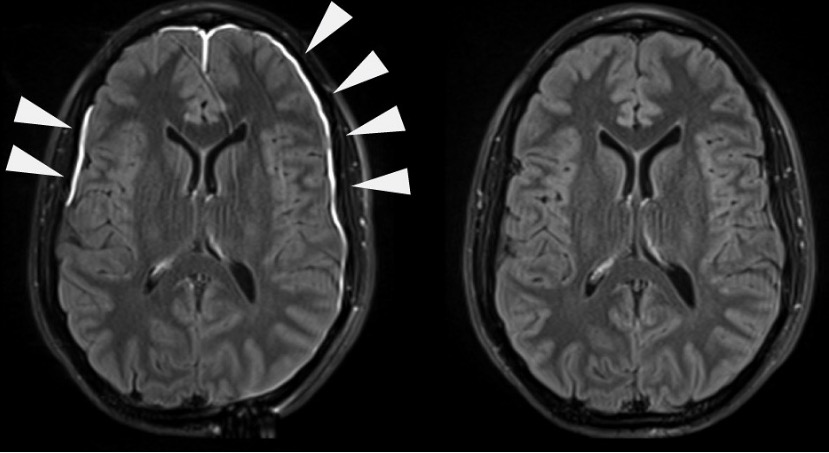Playlist
Show Playlist
Hide Playlist
Acute Bacterial Meningitis: Predisposing Factor Age
-
Slides 10 CNSInfections Neuropathology I.pdf
-
Reference List Pathology.pdf
-
Download Lecture Overview
00:01 Here's another table for you. 00:02 What do you know about these tables? Money. 00:04 What does that mean? It means you need to make sure you take these tables and get a good understanding, reminding information that in this table if you truly understand your pathology. 00:14 These tables speak volumes to you, it can use in pathology, pharmacology, microbiology, so on and so forth. 00:21 So here the topic is still acute bacterial meningitis. Okay? Strictly, bacterial. 00:28 Tell me about glucose in your cerebrospinal fluid, high or low? Low. 00:33 Protein content, high or low in the CSF? High. Your WBC's? Well, granted WBC would be elevated in any type of meningitis. 00:44 But here specifically, what kind of WBC's would you expect to see in bacterial? Good, neutrophils. 00:51 Okay. Now, based on that what are the arameters that we're looking at here? We have the predisposing factors in terms of age, then depending on the age, we'll talk about the most common bacterial pathogen and then quickly, we'll take a look at management, commonly for antimicrobial therapy. 01:08 Less than one month, what are the organisms? You come positive streptococcus agalactiae, agalactiae. Memorize that. 01:16 E. coli, gram negative organism. Listeria, at least know those three organisms causing acute bacterial meningitis in a child less than one month. 01:26 Antimicrobial therapy, this keeps changing but for the most part, you have ampicillin being a common denominator plus cefotaxime or may be perhaps aminoglycoside. 01:38 Now, what an interesting point that the boards love to asked in clinically that you need to make sure that if you're getting questioned by your attending and you wanna make sure that your well versed with a, let's say drug interactions. 01:51 1 to 23 months and now we're getting close to two years; what kind of organisms are we looking at here? Still streptococcus may be perhaps but this time it's pneumoniae; neisseria it's ringing its ugly head here and you still have agalactiae and we have a new comer and that would be our haemophilus influenza. 02:10 Keep that in mind but I wanna make sure that you're clear. 02:15 Here, if you're thinking about this age group may be perhaps a vancomycin. 02:21 And we have a little bit later. A little bit later, meaning what? The two extreme ages of life; very young and very old. 02:32 For this row; very young, very old. We have streptococcus pneumoniae and neisseria species; once again a vancomycin. 02:41 Then greater than 50, you should be thinking about streptococcus pneumoniae and maybe perhaps your listeria monocytogenes. 02:49 Alright, so now, we're getting to old once again a vancomycin plus ampicillin and then you have plus your third-generation. 02:55 So, here's a general overview as to what you can expect in terms of common pathogens, to all of these oral bacteria, okay.
About the Lecture
The lecture Acute Bacterial Meningitis: Predisposing Factor Age by Carlo Raj, MD is from the course CNS Infections - Clinical Neurology.
Included Quiz Questions
A 14-day-old female infant is brought to the ER with irritability and listlessness. Her mother complains that the child has not been feeding well and has been constantly crying for the last 24 hours. The child was born full term by normal vaginal delivery and does not have any medical conditions. A review of systems is unremarkable. Which of the following is the most likely pathogen causing the infant's condition?
- Listeria monocytogenes
- Streptococcus pneumoniae
- Haemophilus influenzae
- Neisseria meningitidis
- Neisseria gonorrhoeae
A 38-year-old man is brought to the ER with an altered sensorium. His wife says that he has been acting strangely for the last few days. He does not have any medical conditions. His vitals are normal, but his temperature is 101 degrees Fahrenheit. There is no history of chest pain, shortness of breath, diarrhea, or constipation. A physical examination shows flexion of his hips and knees when his neck is flexed. What is the most likely pathogen causing his condition?
- Streptococcus pneumoniae
- Streptococcus agalactiae
- Streptococcus viridans
- Streptococcus pyogenes
- Streptococcus bovis
Customer reviews
4,0 of 5 stars
| 5 Stars |
|
3 |
| 4 Stars |
|
0 |
| 3 Stars |
|
0 |
| 2 Stars |
|
0 |
| 1 Star |
|
1 |
Already taken the step but these are great review lectures to keep the knowledge fresh. Appreciate the lectures Dr Raj!
The video was very down to earth and easy to understand. Thank you
I'm glad you fixed the mistakes in the classes so we can fully trust lecturio.
Tons of mistakes in what seems to be all fields of Lecturio videos. It's a shame really. This one in particular goes on about the "virus" H. Influenzae. It's just tons of basic stuff that they really mess up. I wouldn't even use this as a free resource honestly.








